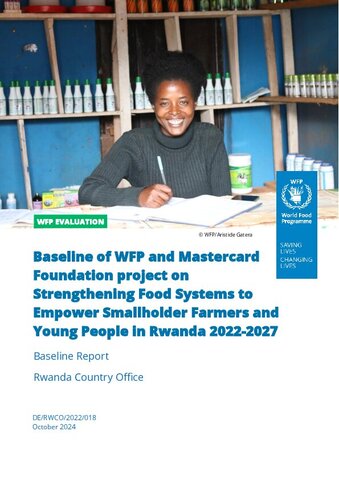
The five-year, USD 15 million project is implemented across all 30 districts of Rwanda to strengthen local agri-food systems with a particular focus on promoting the participation of youth and women in the agriculture sector.
The project aims to engage 200,000 smallholder farmers (SHFs), with at least 50 percent being women and 80 percent youth, and to enroll 600 farmer service centres (FSCs), with 60 percent operated by women and 80 percent by youth. The key objectives are to grow SHF profits, improve post-harvest processes and expand access to finance through interventions focused on market access, capacity and skills development and creation of a blended finance facility.
The baseline study served the dual objectives of both learning and accountability. It provides baseline values for indicators in the logical framework and outlines lessons relevant for ongoing implementation. The baseline will be used by the planned mid-term and final evaluations to assess relevance, coherence, effectiveness, efficiency, sustainability, and impact of Shora Neza. Although the project was initiated in March 2022, delays in initial implementation led to this baseline study being undertaken from June 2023 to July 2024.
Both quantitative and qualitative primary data was collected for the baseline, from project participants (smallholder farmers and farmer service centres) and key stakeholders. A longitudinal study design was developed, with the baseline serving as the starting point for periodic quantitative outcome data collection over the five-year implementation period.
Key findings
- The programme design and approach is highly relevant to the needs and priorities of smallholder farmers and agri-preneurs, including youth and women. In practice, the targeting process faced challenges due to selection criteria and limited candidate pools.
- Shora Neza aligns well with national priorities and policies and is complementary to objectives and initiatives of UN agencies, NGOs, and private sector partners operating in the agriculture and youth development space in Rwanda. However, gaps were identified in establishing systematic engagement strategies with private sector partners and in joint monitoring and follow up.
- The programme incorporates strategies for long-term impact, such as capacity building, financial literacy, establishing lasting networks and market linkages. However, it lacks comprehensive risk analysis and contingency planning.
- While the program shows a commitment to gender equality and women's empowerment, there are notable gaps in mainstreaming disability inclusion and addressing the needs of other marginalized groups.
Conclusions
The programme shows strong relevance, coherence, and commitment to sustainability. Its targeted approach and alignment with national and international priorities lay a solid foundation for long-term impact. However, improvements are needed in selection processes, coordination, and risk management. The programme must also enhance its inclusivity strategies to ensure comprehensive support for all marginalized groups. Monitoring mechanisms to track implementation progress against plans were limited at the time of the baseline, and systematic feedback processes were not yet established.
Key lessons
- FSC targeting: Diverse outreach methods are needed to meet entrepreneurship criteria and demographic targets. The study highlighted challenges in the selection process for FSCs, which relied on predefined lists and resulted in a high dominance of male-led centers, thus hindering the achievement of gender balance.
- SHF targeting: Current classification criteria may be too broad, potentially including participants outside the intended target group. In the baseline, there were a wide range of farm sizes among SHFs, with some engaging in large-scale farming.
- Regular reporting: Lack of systematic progress reporting limits adaptive management.
- Holistic support: Targeting existing entrepreneurs in agriculture value chains builds on participants' knowledge and aspirations.
- Youth employment strategies: Collaborative approaches, such as the 'One plus one' mechanism, foster knowledge dissemination and create employment opportunities, contributing to economic empowerment and community resilience.
| Document | File |
|---|---|
| Terms of reference |
PDF | 939.42 KB
Download
|
